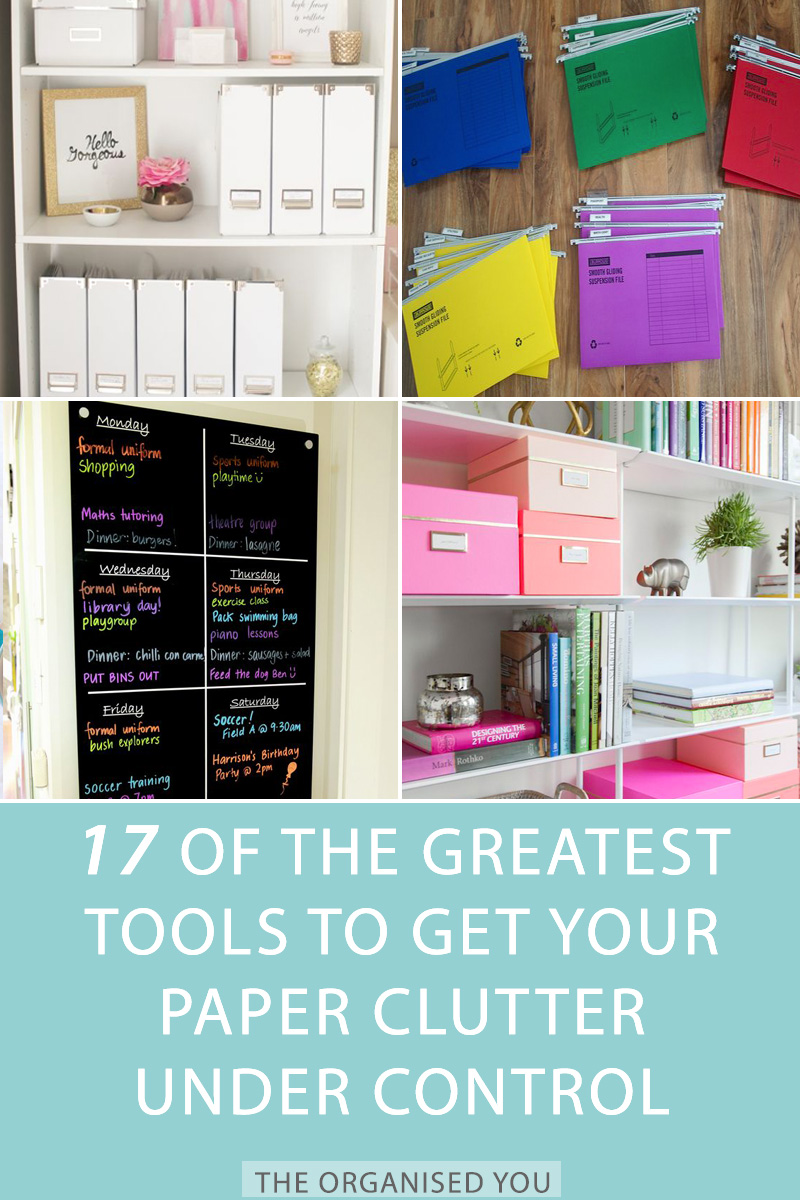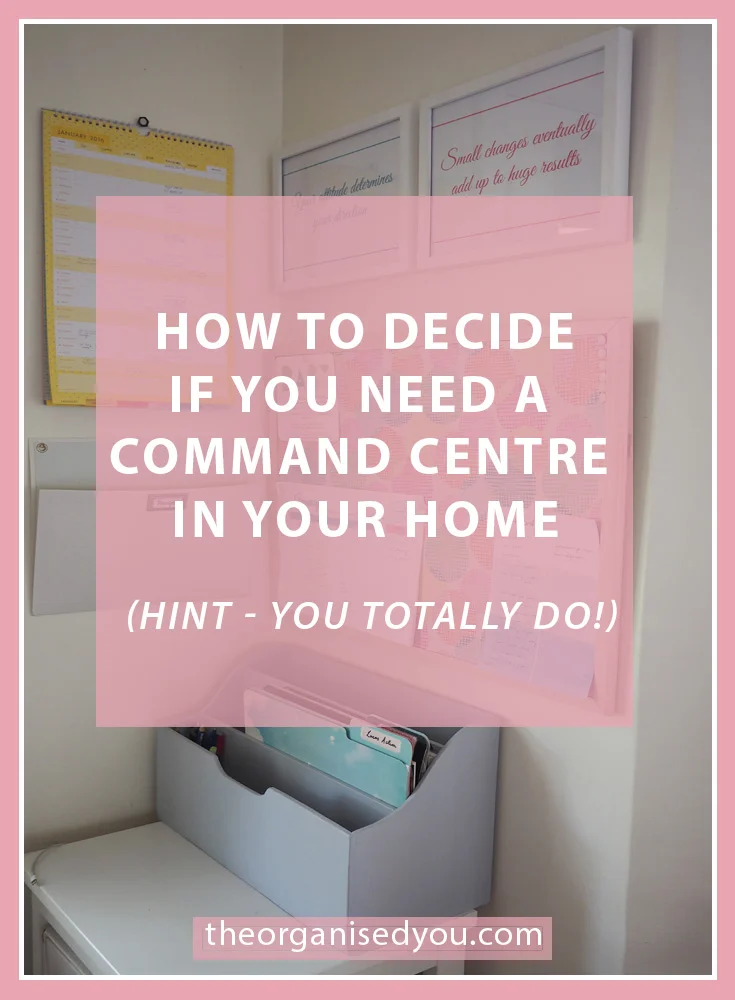Can you relate to this situation? You walk through the door from work or school pick-up, and despite the fact that you’re bone-tired and could quite easily slump on the couch with a cuppa and a magazine, instead you’re faced with school bags that need to be unpacked, a pile of mail and bills to wade through, and notices to read (and actually deal with) from kinder and school. Ugh, the last thing you feel like doing, right?
Wouldn’t it be great if you had an organised ‘drop-spot’ where you could quickly deal with these tasks and actually get yourself to said couch with minimal effort? Yes please!
If you’ve been following the blog over the last few weeks, you KNOW I’m going to tell you that the command centre is your answer. And for good reason! Not only does the command centre give you somewhere to store and sort paperwork (probably this zone's most important function), it also helps keep you on track with those never-ending tasks and to-do’s.
Today I’m sharing 7 proven essentials (and a FREE detailed checklist & planner) that will help you create the most functional, practical, and organised command centre. You’ll be totally rocking your home organisation in no time!
1 | Vertical space
Vertical space is a must with a command centre, because it’s so helpful to have important information on display and easy to see. Rather than having reminders, invitations and weekly tasks tucked away inside a drawer or diary, it's much more useful to have them pinned in a spot where you can see what's coming up at a glance.
The great thing about a command centre is that it really doesn’t need to take up a huge amount of space. Taking advantage of vertical space is especially useful if you’re short on floor-space. Have a look around the main zones of your home (i.e. kitchen, living room, entryway) to see if there’s a corner of unused space that might be useful. For us, under the stairs was the perfect spot!
By utilizing any available vertical space, you'll be able to store a calendar, memo board, weekly planners, decorative items, and even paperwork organisers. You can check out some great ideas for using vertical space on my Pinterest Family Organising Ideas board.
In my own command centre (check out the detailed tour in this video) we use the back wall space to hide away all the important info that we need to refer to on a daily basis. The front section of our command centre [under the stairs] is used for decorative items and storage.
2 | Paperwork Organiser
The number one purpose of a command centre is to provide a specific place to sort and store your paperwork. Which definitely makes a paperwork organiser an essential item! I actually call our organiser the ‘incoming’ paper organiser, because this is where I store and sort the paper that comes into our house on a daily basis.
In a recent Q & A episode, I talked about how to assess your paper piles to work out exactly which paper categories you have lying around your home. In our case, before I created this incoming paperwork system, the paper piles building up on our kitchen benches included daily letters, junk mail, bills, newspapers, magazines, and forms to be filled out. This was before our kids came around, so there was definitely less paperwork to deal with than we currently have. Luckily I got this paperwork system working before then!
Our current paperwork organiser has 3 divided sections, where I store labelled file folders to sort our paperwork into specific categories.
All the folder files are stored in the back slot of the organiser until a task comes up. I then put the task into the appropriate file folder (i.e. a bill to be paid goes into ‘Household Tasks’) and move the folder forward into the middle slot so I know I have a task to complete. I deal with our paperwork on one day of the week (usually Friday), and when all the tasks are complete, the folders return to the back compartment.
There are obviously a few other moving parts to our entire paperwork organisation, but for our incoming daily paper, this system has been working for me for over 5 years now, so I know I’m onto a winner.
FREEBIE ALERT! Want a detailed checklist of all the command centre essentials to help you plan out your new space? Get your copy on the button below...
3 | Memo board
Whether you use a whiteboard, chalkboard, magnetic or cork, a memo board is essential for your command centre. It can be used to display upcoming events and invitations (i.e. birthday parties, engagements, weddings, school or kinder events); school or work schedules, and important reminders (i.e. car service notices or appointments). I don’t typically display our bills on our memo board, as we keep ours tucked into the file folders as a ‘task’, but you could use it for this purpose as well.
Our memo board also displays our 90-day goals, weekly planner and household chores list - and this is where it’s useful to have vertical wall space for a decent-sized memo board! Having these things on display means it’s easy to check which tasks you need to attend to, and helps keep you more organised and productive.
>> Want to learn the step-by-step process for creating a family command centre in your home? Discover how to do it in my online program 'Making Your Paper Work'. Find out more >>
4 | Weekly planner
If you’re wanting to be as productive as possible every day, then a weekly planner is a must, and what better way to display one than in your command centre!
I’ve talked at length about my new approach to weekly planning, where I batch the tasks I need to complete into specific categories. This allows me to be more productive, as I can get through a bunch of similar tasks in one sitting i.e. phone calls, errands, computer tasks. This method is much more productive than writing out a long list of to-do’s, where it's difficult to work out exactly what takes priority, and which order to tackle everything on your plate.
Having a weekly planner front and centre on your memo board means you’ll have that visual reminder of the tasks you need to get through, which will help you set priorities.
5 | Calendar
If you’re a paper-loving girl, as opposed to digital, then a calendar will be an essential for your command centre. A calendar that has separate columns or sections for each family member makes it easy to see what’s on for each person, and allows you to keep track of everyone’s schedules.
While a calendar is great for noting all various events and reminders, a display of your weekly schedule might also be a good idea, particularly if you have a large family and everyone always seems to be here-there-and-everywhere! I love this family schedule display, but it all depends on how much vertical space you have to work with.
6 | Household binder
A household or family binder is a fantastic solution for keeping the important information that you need to refer to regularly, close at hand. It prevents you having to rifle through stacks of paperwork or a filing cabinet to find the information you need. It’s also great to have when you're filling out forms, as all those important numbers are easy to find. You can see how I set ours up in this post.
This year, with my eldest at school and my youngest at kinder, the incoming paperwork has definitely increased, so it’s helpful to have set systems in place. Whenever there’s an important notice from school that I’ll need to refer to again, such as the canteen menu, class list, term newsletter or parent information, I just give it a quick hole-punch and pop it in the appropriate section of our household binder.
A 2-minute clear-out of the binder once a term means I can get rid of any info that’s no longer relevant, and we’re good to go again!
Although I know I could find a lot of this information online, I like just being able to grab the binder and have a quick look through rather than always having to get onto the computer or my phone. If you don’t have a household binder, I highly recommend creating one - they are such a time and stress saver!
7 | Office supplies
The final thing you’ll want to have in (or near) your command centre are supplies for dealing with paper-related tasks. This could include pens, pencils, sharpies, erasers, glue-stick, sharpener, sticky-tape, hole-punch, scissors, and paperclips (to name a few!).
I like to use small plastic baskets and boxes to separate the different supplies within a drawer so they’re easy to find. I use a kitchen drawer to store most of our supplies (which is right near the command centre), but I do store pens and pencils within a compartment of the paperwork organiser. Super handy!
Before I personally launch into any new project, I always ‘shop my home’ first to see if I have any existing products that could be useful or even repurposed. If you’re thinking of creating a command centre in your own home, I recommend that you shop your own home first and see what could possibly be used in this new space before you go out and spend a fortune!
There are a few other essential items that you might like to have in your command centre, but if you’re not sure exactly what you should have or need, then I’ve created this detailed checklist to give you some ideas. It lists ALL the items you might need to consider creating a ‘home’ for within this space, and helps you distinguish between actual wants and needs, and create a bit of a plan for getting your ideas sorted. You can grab your free checklist by clicking on the button below.



































